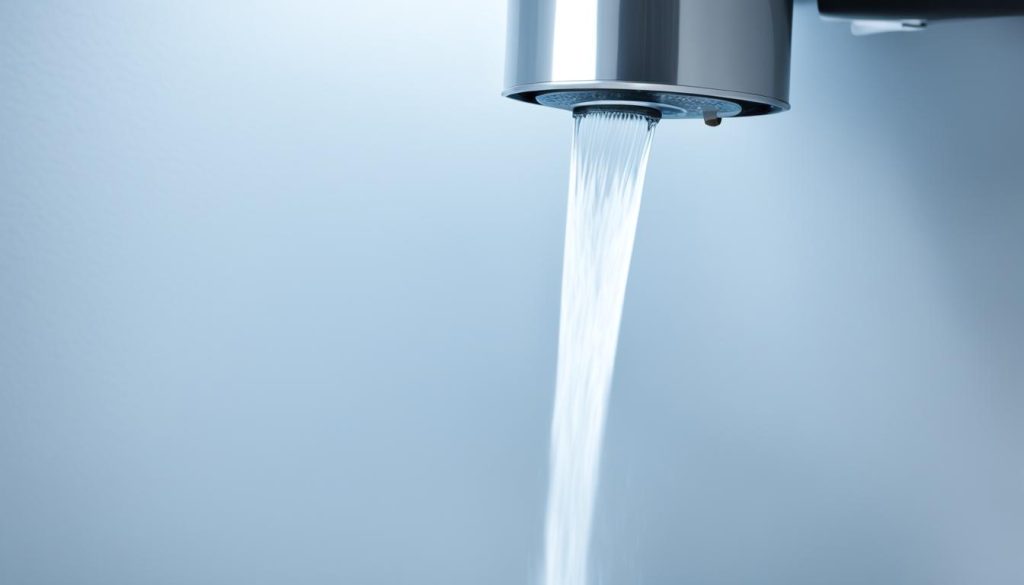Why Your Plumbing Sounds Like a Foghorn Explained
Did you know that plumbing noises can often mimic the sound of a foghorn? It may seem surprising, but the scale and impact of this issue can be significant. If you’re constantly hearing a loud foghorn-like noise from your plumbing, it’s a clear indication that there’s a problem with your plumbing system. Don’t worry, though – diagnosing and resolving the cause behind these unsettling sounds is possible with the help of a professional plumber.
Key Takeaways:
- Plumbing noises can resemble the sound of a foghorn and can be disconcerting.
- If you’re experiencing these noises, it’s essential to consult a professional plumber for a thorough diagnosis.
- The sources of plumbing noises can include toilets, faucets, pipes, water heaters, water pressure, and water supply lines.
- Common causes of a foghorn sound include issues with the ballcock valve in toilets, loose faucet washers, old or loose water pipes inside the walls, mineral buildup in water heaters, and other plumbing system problems.
- Addressing these issues promptly can ensure the efficient operation of your plumbing system and provide peace of mind.
What Causes a Foghorn Sound from the Toilet
A foghorn sound coming from the toilet can be quite annoying and puzzling. Fortunately, the cause of this unusual noise is often related to the ballcock valve, which is also known as the flapper or toilet fill valve. The ballcock valve is responsible for regulating the water flow into the toilet tank after each flush.
The foghorn sound occurs when there are issues with the ballcock valve, specifically with the washers inside the valve. Over time, these washers can become loose or worn out, causing vibrations and resulting in the foghorn noise. To determine if the ballcock valve is the culprit, you can perform a simple test:
- Open the toilet tank.
- Flush the toilet.
- Lift the float to the top of the tank.
If the noise stops when the float is raised, it indicates a problem with the ballcock valve. In this case, replacing the valve is recommended to eliminate the foghorn sound from your toilet. It’s best to seek the assistance of a professional plumber for the replacement to ensure proper installation and optimal functionality.
Remember, addressing plumbing issues promptly can help prevent further damage and potentially save you from more extensive repairs in the future.
Example of Ballcock Valve Replacement:
| Tools Required | Materials Required |
|---|---|
| Screwdriver | New ballcock valve |
| Adjustable wrench | New washers |
| Pliers | Plumber’s tape |
What Causes a Foghorn Sound from a Faucet
If you’ve ever heard a foghorn sound coming from your faucet, don’t worry – you’re not alone. This unsettling noise can be caused by a few different factors, but one common culprit is a loose faucet washer.
Over time, the constant use of your faucet can loosen the screws holding the washer in place. This loosening can create vibrations and turbulence in the water flow, resulting in the foghorn sound you’re hearing.
To address this issue, you can start by checking the screws on your faucet. Using a wrench or pliers, gently tighten the screws to secure the washer more firmly. This simple step may be enough to eliminate the foghorn sound and restore peace to your sink.
If tightening the screws doesn’t solve the problem, it’s possible that the washer itself is worn or damaged. In this case, you’ll need to replace the washer entirely. You can find faucet washers at most hardware stores or consult a plumber for assistance.
If tightening or replacing the washer doesn’t eliminate the foghorn sound, it’s best to seek the help of a professional plumber. They can provide a thorough assessment of your faucet plumbing and identify any underlying issues that may be causing the noise.
Remember, addressing plumbing issues promptly can help prevent further damage and more costly repairs down the line. Don’t hesitate to reach out to a qualified professional if you need assistance with your faucet or any other plumbing concern.
Summary
In summary, a foghorn sound from a faucet is often caused by a loose faucet washer. Tightening the screws or replacing the washer can usually resolve the issue. If the noise persists, it’s recommended to consult a professional plumber for further assessment and assistance with your faucet plumbing.
| Causes of Foghorn Sound from a Faucet | Possible Solutions |
|---|---|
| Loose faucet washer | Tighten the screws or replace the washer |
| Worn or damaged washer | Replace the washer |
| Other underlying issues | Consult a professional plumber |
What Causes a Foghorn Sound from Inside the Walls
If you hear a foghorn sound coming from inside the walls, it can be both alarming and perplexing. This phenomenon is often caused by old pipes or loose water pipes within your home’s plumbing system. In older houses, the pipes are more prone to deterioration and movement, leading to the rattling sound resembling a foghorn. To pinpoint the exact location of the issue and ensure an accurate diagnosis, it’s best to enlist the help of a professional plumber who has the necessary expertise and specialized tools.
Identifying Old Pipes
Identifying whether you have old pipes in your home can provide insight into the cause of the foghorn sound. Old pipes are usually made of materials such as galvanized iron or lead, both of which are more susceptible to corrosion and damage over time. If your house is several decades old, it’s likely that the plumbing infrastructure consists of these older materials.
The Importance of Loose Water Pipes
Loose water pipes can also contribute to the foghorn sound within the walls. Over time, pipes can become disconnected or develop loose connections due to factors such as ground shifting or inadequate installation. When water flows through these loose pipes, the movement and vibrations can create the distinct foghorn-like noise.
Addressing the issue of a foghorn sound from inside the walls requires the expertise of a professional plumber. They will use specialized tools to identify the precise location of the problem without causing excessive damage to your walls or floors. Once identified, the plumber can recommend appropriate repairs, which may involve replacing old pipes or securing loose connections.
By addressing the underlying cause of the foghorn sound, you can restore peace and quiet to your home while ensuring the integrity of your plumbing system.
| Causes | Implications | Solutions |
|---|---|---|
| Old pipes | Potential for corrosion and leaks | Replace old pipes with newer materials |
| Loose water pipes | Risk of burst pipes and water damage | Secure loose connections or replace damaged pipes |
What Causes a Foghorn Sound from the Water Heater
If you hear a foghorn sound coming from your water heater, it is likely caused by mineral buildup on the burners. Over time, minerals in the water supply can accumulate on the burners, causing a disruption in the smooth flow of gas. When the gas is not able to flow properly, it creates a loud foghorn-like noise.
To prevent this issue, it’s recommended to schedule an annual water heater flush. During a water heater flush, a professional plumber will drain the tank and remove any sediment or mineral buildup that has accumulated over time. Flushing the water heater not only eliminates the foghorn sound but also helps to maintain the efficiency and lifespan of the unit.
In addition to regular water heater flushes, installing a water softener can also help prevent mineral buildup in the future. A water softener works by removing minerals from the water supply, reducing the likelihood of buildup on the burners and other components of the water heater.
Benefits of Regular Water Heater Flushing
- Reduces the risk of mineral buildup
- Improves energy efficiency
- Extends the lifespan of the water heater
- Preserves water quality and taste
Comparison of Water Heater Flush Frequency
| Flush Frequency | Benefits |
|---|---|
| Annual Flush | Prevents mineral buildup, improves efficiency |
| Biennial Flush | Slightly increased risk of mineral buildup and decreased efficiency |
| Infrequent Flush | Higher risk of mineral buildup, decreased efficiency, and potential damage to the water heater |
By maintaining a regular water heater flushing schedule and considering the installation of a water softener, you can eliminate the foghorn sound and ensure that your water heater operates efficiently for years to come.
What Other Problems Can Cause a Foghorn Sound
In addition to the common causes mentioned above, a foghorn sound from plumbing can also result from a variety of other issues. These less common causes include water pressure concerns, washing machine issues, faulty pipe installation, and water supply line problems. Let’s take a closer look at each of these factors:
Water Pressure Concerns
Water pressure plays a crucial role in your plumbing system’s performance. If the water pressure is too high, it can lead to vibrations and noise in your pipes, resulting in a foghorn sound. On the other hand, low water pressure can cause air to enter the pipes, creating the same sound. A professional plumber can assess your water pressure levels and make any necessary adjustments to eliminate the noise.
Washing Machine Issues
If you notice a foghorn sound whenever you run your washing machine, it could be a sign of an issue with the machine itself. Faulty internal components, such as bearings, pumps, or valves, can create vibrations and cause the noise. It’s recommended to contact a washing machine repair specialist to diagnose and fix the problem.
Faulty Pipe Installation
In some cases, a foghorn sound can be the result of faulty pipe installation. If pipes are not securely fastened or have loose joints, the movement and vibrations caused by flowing water can generate the noise. A professional plumber should be called in to inspect the pipes and ensure they are properly installed.
Water Supply Line Problems
Issues with the water supply line can also contribute to a foghorn sound in your plumbing system. For example, a partially closed main water valve can create turbulence and cause the noise. Additionally, if there are any obstructions or debris in the water supply line, it can disrupt the smooth flow of water and lead to the sound. A plumber will be able to identify and resolve these supply line issues.
To determine the underlying cause of a foghorn sound and effectively resolve the issue, it’s best to seek professional assessment and intervention by a licensed plumber. They have the expertise and experience to diagnose and fix complex plumbing problems, ensuring your system operates quietly and efficiently.
| Problem | Cause |
|---|---|
| Water Pressure Concerns | High or low water pressure |
| Washing Machine Issues | Faulty internal components |
| Faulty Pipe Installation | Loose joints or insecure fastening |
| Water Supply Line Problems | Partially closed main water valve or obstructions |
Why Choose Vaughan for Noisy Plumbing Problems
If you’re dealing with noisy plumbing problems in Southern New Jersey, Vaughan Comfort Services is here to help. With over 80 years of experience, our team of licensed and insured plumbing professionals is well-equipped to handle any plumbing issue, including those pesky foghorn sounds.
At Vaughan, we pride ourselves on delivering exceptional service to every customer. Our experienced plumbers are known for their personal and professional attention to detail, ensuring that each job is handled with the utmost care and expertise.
When it comes to addressing noisy plumbing problems, our team takes a tenacious approach. We have the necessary tools and parts to diagnose and resolve the issue efficiently, so you can enjoy a quiet and peaceful plumbing system once again.
Contact Vaughan Comfort Services today to schedule an appointment with our skilled plumbers. Noisy plumbing problems are no match for our experienced and licensed professionals. Give us a call or fill out our online contact form, and we’ll be happy to assist you.
Source Links
- https://www.pvcworkshop.com/why-does-my-plumbing-sound-like-a-foghorn/
- https://www.vaughanhvac.com/plumbing-sounds-like-foghorn/
- https://www.lutzplumbing.com/why-does-plumbing-sound-like-a-foghorn
- Investing Wisely: How Windows & Doors in Boost Property Value and Financial Health - April 24, 2025
- The Financial Impact of Personal Injuries: Why Legal Help Matters for Business Owners - April 16, 2025
- The Hidden Financial Costs of Domestic Assault: What Business Owners Need to Know - April 16, 2025













